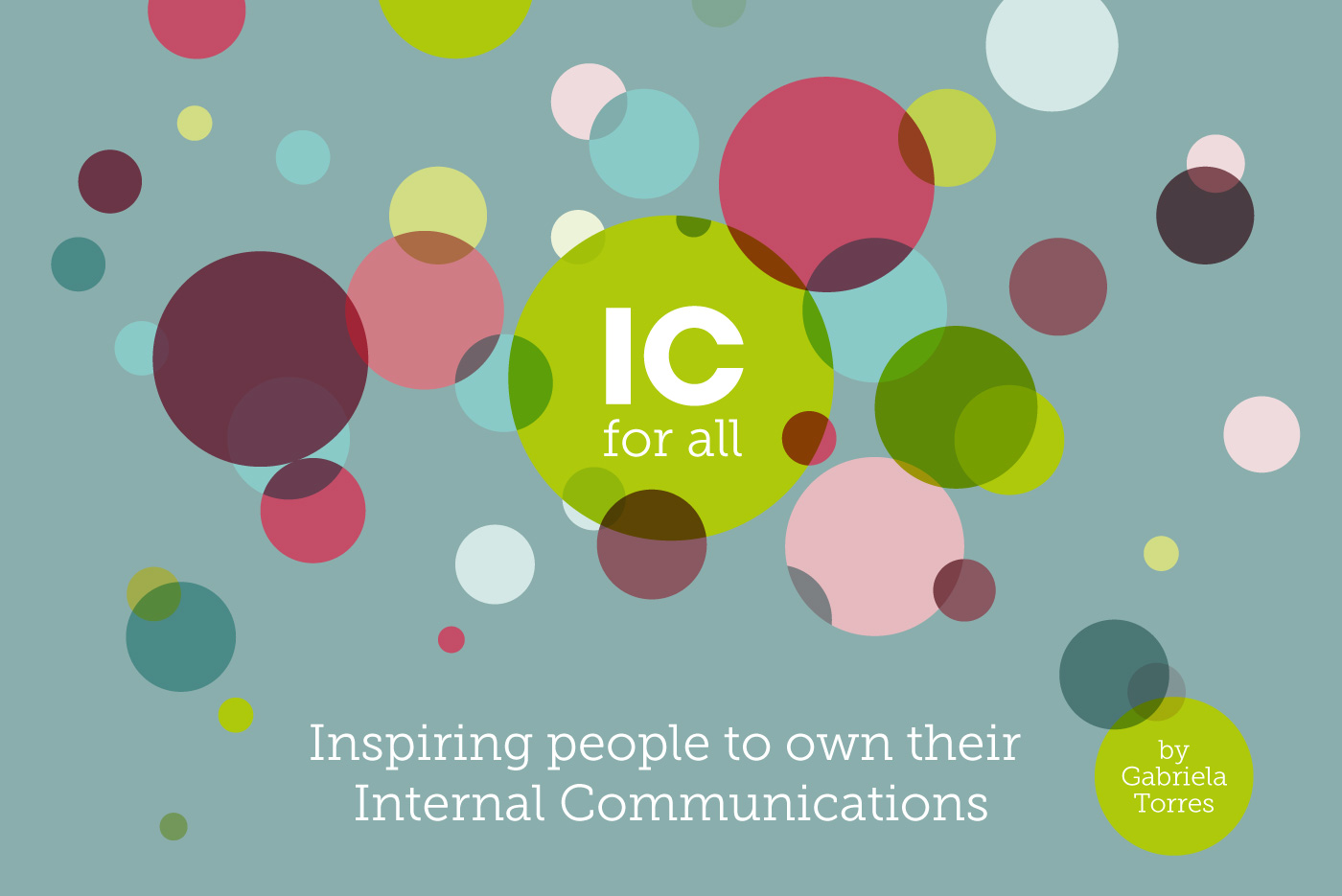
It’s a big question in the internal comms industry: should ownership of internal communications sit solely with the IC team, or by everybody across the organisation? Internal comms practitioner Gabriela Torres believes it’s up to everyone to own communications and become a part of the story – so we invited her to the H&H blog to share her thoughts.
Wouldn’t you agree that building a strong internal comms network across any organisation, with people who understand the importance of our work, is at the core of what we do as IC professionals?
It has never been an easy task gaining support from an organisation towards IC initiatives, and getting through to people with the idea that internal comms doesn’t just belong to a designated IC team but to everyone, because it has a direct impact on overall business results.
But the good news is that there are a few ways to start shaping these behaviours in people outside the IC team and making internal communications part of ‘everyday business’ in an organisation.
These networks can be made up of HR professionals, managers, supervisors, or really anyone with a willingness to contribute – all of those people who most likely we have identified by now.
The biggest challenge with pulling together these dream networks is that for most people, IC processes become additions to existing roles that already have many responsibilities.
Embedding internal communications into everyday activity
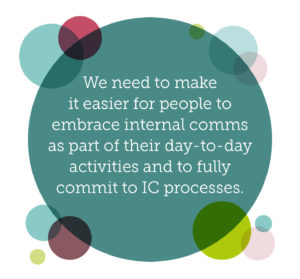 That’s why we need to make it easier for people to embrace internal communications as part of their day-to-day activities and to fully commit to internal communications processes.
That’s why we need to make it easier for people to embrace internal communications as part of their day-to-day activities and to fully commit to internal communications processes.
To accomplish this goal, it’s crucial that the people in these networks have an overall understanding of the value of what they’re doing when it comes to internal comms, as well as the impact of their actions.
But there’s a whole other side to this for which we need to remember that organisations are made by people. And these people need to be inspired to do what needs to be done.
Therefore, I’ll be sharing three steps we can all take to inspire people to get involved with the magic of internal communications.
Get exciting dollops of internal comms inspiration delivered straight to your inbox, every week!
Subscribe to our Friday Ketchup to get handpicked internal comms and employee engagement insights, facts, and ideas squeezed straight into your inbox, every Friday.
3 ways to inspire people to own internal communications
1. Training
Training is one of the most important assets we have. It allows people to not only get better at what they’ll be doing, but it also shows them how valuable they are to the organisation.
There are two areas of training we need to focus on, at least at the beginning: technical skills and processes.

Technical-skills training delivers technical knowledge such as writing, photography, and interpersonal communication, among others.
Why is it important for these key people to have these skills? The simple answer is because no-one likes to do something that they feel they know nothing about or aren’t any good at.
With training, we’re giving them the power to become experts in these tasks and if they already understand the importance of internal communications, they’ll be more likely to place their puzzle piece in the spot where we need it to be.
Processes training is also important because it’ll allow communication to flow without any roadblocks.
Not everything needs to go through the IC team, and there are other activities that could benefit from our input to generate a bigger impact.
Depending on the processes we have in place and the guidelines available for people to use, they can either implement initiatives by themselves with help from their managers, or refer back to us.
It all depends on the objective, audience, time and budget available.
Keep in mind that the more autonomy people have to roll out their own initiatives, the more likely they are to do it enthusiastically.
For example, local messages that need to be delivered in a specific time and for a specific branch can be produced by their manager or HR advisor following certain guidelines, while an employee-turnover issue could use the expertise of the internal communications team and be referred on in order to be addressed.
2. Unspoken competition & visibility
Most people want to share their experiences and have their voices heard, whether it’s through feedback given to managers, participation in a company’s activities, or being portrayed in internal comms.
The importance of collecting this feedback, as well as acting upon it and keeping the conversation going with all employees, is key – as all IC professionals know.
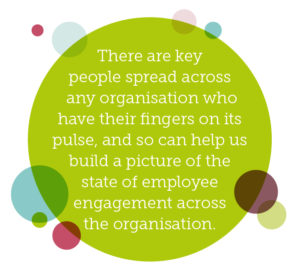
So the following question comes up: how can we, as IC teams, do all this? Hearing everything, and being everywhere?
The answer is we don’t and we can’t. That’s why there are key people spread across any organisation who can take on this task and make the most of it, helping us to achieve business goals.
And there’s one thing that can spark the desire of people to be the heart and mind of the IC team, and that’s gaining visibility through unspoken healthy competition.
Being recognised as an informal leader is a great asset to have no matter the department someone belongs to, and participating in these activities is also a good way to demonstrate commitment to the organisation.
So how do we promote it? Acknowledging the people that help us, always.
Some examples of this can be crediting them in internal communications, reporting top contributors as ‘internal comms champions’ in yearly reports, congratulating individuals and having senior leaders and managers acknowledge them, helping them work through communications issues of their own and even considering small details such as sending a thank-you card at the end of the year or taking them out to lunch.
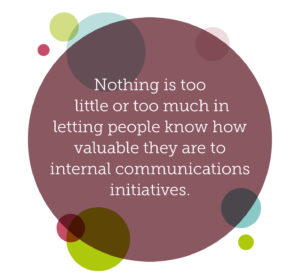
Nothing is too little or too much in recognising them and letting them know how valuable they are to internal communications initiatives.
As a bonus, other people can also be inspired by this and contributing can become something aspirational.
It comes down to choosing the right factors depending on the dynamic of the organisation, but at the end of the day people need to be recognised for the extra miles they go.
3. Sharing results
As well as acknowledging the work these people do for us, sharing with them the results they contribute to delivering is equally important.
We all want to build great things and when we can actually see the rewards, it motivates us to do more. So why not share this information?
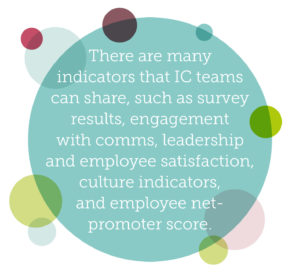
There are many indicators IC teams can share separately or as part of an overall KPI such as survey results, engagement indicators within internal channels, organisation leadership and employee satisfaction, culture indicators, and employee net-promoter score amongst many others.
But the trick is in sharing this information before you communicate it to the rest of the organisation, even if it’s considered ‘confidential’.
Why? Because these people are actually helping us get these results, whether good or bad.
Good results should be celebrated, while results to be improved require feedback and input from the out-of-the-box thinking that comes from belonging to different departments than IC and being in close proximity to other people in the organisation.
This way we can engage them with internal communications processes by giving them a voice in what goes on and making them a part of our team.
In addition to sharing results, it’s important that we explain how the indicators and information fuel broader organisational goals and impact their everyday work too.
Linking IC indicators to productivity, sales, turnover and quality for example, or to whatever we are measuring within our organisations, will help them understand the reason why internal communications belongs to everybody.
Meet the author

Gabriela Torres
I am a Barcelona-based communications specialist with extensive experience in offline internal comms and creative writing. I’ve worked in the manufacturing and education industry, focusing on employee engagement and emerging internal channels. I love to inspire employees so that they feel empowered to figure out their own goals and shoot for the moon. In my free time, you can find me writing mostly about animal advocacy or personal growth.
When you’re involved in creating something amazing, you’re more motivated and empowered to make it a success.
Our change communications programmes put your employees front-and-centre, making them a central focus of the messaging to inspire them to help deliver sustainable and exceptional results. Get in touch to find out how we can help you implement positive and successful change in your organisation!
Got a brilliant idea you simply can’t keep to yourself?
We’re always looking for fresh faces to help us further the IC conversation by writing guest articles for our blog. If you want to make your voice heard on internal comms, employee engagement, change management or leadership development, we’d love it if you got in touch!












